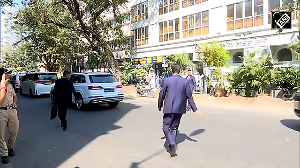Watson claimed spotters on the ground kept the terrorists's handlers in Pakistan informed about the position of police forces during the three-day siege of Mumbai.
Indian security agencies investigating the attacks have insisted that there was no direct local links in the attacks. From day one, the investigators have stated that the attacks were planned and executed from Pakistan.
The Mumbai police said the attacks were carried out without any help from the Indian modules of the Lashkar-e-Tayiba, the Pakistan-based outfit blamed for the terrorism.
The Mumbai police say the terrorists's handlers in Pakistan obtained information about the positions of the security forces by watching reportage of the attacks on Indian and international television channels.
Watson spoke to rediff.com's terrorism expert Vicky Nanjappa on the telephone from London about how he concluded that local spotters were involved in the attacks.
Your story speaks about local links involved in the Mumbai attacks. The Mumbai police denies this.
It is important to say that our investigation did not prove a local link, but the evidence we heard suggested that there may have been a local link of some kind.
We already know that Fahim Ansari is accused of making preparations for the attack and that he was part of a local Lashkar-e-Tayiba cell. It is unlikely that he would have acted alone in Mumbai but we cannot prove this.
Conversations with several policemen -- unofficial conversations -- also indicated to us that local links were suspected, but no hard evidence has been found to support this.
Of course, the idea there were local spotters in Mumbai reporting back to the terrorist leaders has been strongly denied by Mumbai's Additional Police Commissioner Deven Bharti and we reported this denial in our piece.
Our evidence is circumstantial: The directions from the leaders in Paksistan to the terrorists on the ground (as revealed in the intercepts) suggests there may have been local help. We cannot put the case any more strongly than this.
It would be wrong to report that the BBC says there were local links etc -- we raise the possibility on the basis of the evidence we have seen.
There has been talk of local modules being involved in the Mumbai attacks. Do you think that the police deliberately omitted this aspect so that they could focus on the handlers in Pakistan?
I have no evidence that the police deliberately omitted this angle from their story.
Former intelligence official and security expert Mr B Raman wrote in a rediff column that had there been local links the police and intelligence agencies -- who were closely monitoring the conversation between the terrorists and their handlers -- would have picked up their conversations too.
B Raman is an excellent analyst on these matters, of course. But I am not sure that other local calls would necessarily have been picked up and even if they had been would they be placed into the public domain?
On the night of the attacks, intelligence officers managed to intercept the calls between the terrorists and their leaders with remarkable speed.
If this was achieved because, for example, they already were suspicious about some of the mobile telephone numbers from earlier intelligence and these numbers were being tracked, then it is possible these calls were picked up while others may not have been.
But this is speculation -- ultimately, we simply don't know without access to the full picture from India's Intelligence Bureau and the Research and Analysis Wing.
Are local sleeper cells in Mumbai still active? The Intelligence Bureau informed the Union government two day ago about the presence of such cells whose members are planning on carrying out terror strikes.
I have no information on this.
How different was it for you to do a story on the Mumbai attacks? Were the police forthcoming in sharing information?
We found the police very helpful and forthcoming with information. Of course, they were keener to speak about the investigation -- which was first class -- than the alleged failures of the police response on the night the attacks began. But that is understandable.
Was there any pressure on you not to telecast anything about the local links?
No.
Would you like to share with us how you went about your investigation?
Not really.
How do you think the scenario in India, especially in Mumbai, has changed after these attacks? Also, what kind of impact has the attacks had on the West?
26/11 has changed the way the whole world looks at terrorism.
There is substantial concern in the United Kingdom and the United States, for example, about similar low technology but deadly attacks.
The key fact is multiple targets -- and simultaneous attacks. If the terrorists were looking for a spectacular attack then unfortunately one can say they were successful.
What are your views on how Pakistan has reacted to this issue?
The release of Lashkar founder Hafiz Mohammed Saeed in Pakistan was viewed with dismay in Washington and London. I have no special insight into this, but the general view -- not my view -- appears to be that Pakistan has been slow to investigate the Lashkar's involvement in the Mumbai attacks.




